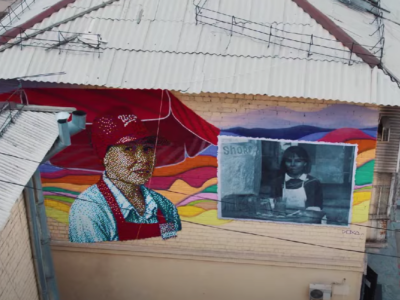“A Pussy Riot of our own” is how Kazakhstani netizens are referring to the judicial drama involving three opposition leaders accused of active participation in the Zhanaozen oil-strike in December 2011. The trials of Vladimir Kozlov, Aizhanat Aminov and Serik Sapargaly started on August 16, and are expected to end within the next two weeks. On Twitter, Kazakhstan's political opposition has been sending out tweets with the hashtag #Kozlov from the court room in Kazakh, Russian and English.
As Joanna Lillis of Eurasianet.org informs, the leader of the unregistered Alga! opposition party, Kozlov, a former oil worker from Zhanaozen, Aminov, and Sapargaly, an activist from the People’s Front political alliance, are all charged with “fomenting social unrest” and “calling for the forcible overthrow of the constitutional order”. Kozlov and Aminov face an additional charge of “setting up a criminal group”. According to Lillis, the trial is “expected to show where authorities in Astana demarcate the border between legitimate political expression and criminal behavior.” Moreover, Kazakh officials have suggested that the three activists were influenced by “third forces”. She continues:
An official investigation concluded that the Zhanaozen unrest was fomented by “third forces” from outside Kazakhstan and perpetrated by activists on the ground. Investigators have accused exiled oligarch Mukhtar Ablyazov of masterminding the violence for political ends with a UK-based accomplice from Kazakhstan, Muratbek Ketebayev. Ablyazov, who is currently on the run from British justice in a fraud case, is a political foe of [Kazakhstani President] Nazarbayev.
While Human Rights Watch and the US Assistant Secretary of State Robert Blake have both expressed their hope for a fair trial, Kazakh netizens have little doubt that the court in the western town of Aktau will follow the example of its Russian counterpart in the recent trial of Pussy Riot [see Global Voices post for background] and hand down draconian sentences to the defendants. As Twitter user Astanchanin tweeted [ru]:
Судебная система Казахстана это зеркалка Российской системы. Посмотрим результаты по #Козлов.
- Supporters of political oppositionist Vladimir Kozlov await a verdict in a courtroom in Aktau, western Kazakhstan. The case of the three defendants is the most high profile in a series of judgements on the events of December 2011 that saw 16 people die when an oil strike burst into violence. (Screen capture from a video uploaded on August 16, 2012 by YouTube user ladakz).
On online forums, discussion mostly centres on the perceived politicization of proceedings and the decision to admit the trio to trial in the first place. Sammitkhan [Саммитхан] comments [ru] underneath an article on RFE/RL's Kazakh service, Azzatyk.org:
Жалко марионеток, участвующих в этом спектакле под названием суд. За свои поступки конечно отвечать надо. Но в первую очередь за Жанаозен должна ответить власть, не решившая этот конфликт и расстрелявшая безоружных людей. Власть и ее приспешники в бессильной злобе готовы навешать на Козлова и других все, даже Арканкерген..Это уже паранойя.
Nevertheless, while few domestic observers believe the country's courts enjoy any sort of independence from Kazakh President Nursultan Nazarbayev, the latter is broadly admired for ensuring the sort of poltical stability enjoyed by the Central Asian republic prior to 2011, an admiration reinforced by state-controlled media. Prizing security over democracy, the view expressed [kz] by another Azzatyk commenter, Sarsenbekov, is typical to many Kazakhstanis:
Оз басым Елбасы устанган саясатты колдаймын, озимиздин ортамыздагы шіріктерден сактанайык. Немесе шетелден келген шириктердин колдаумен журе берсек барлыгымыз кырылып калармыз. Мумкин Алгалыктар артылык кыламыз деп тыртык жасаганшыгар,онын тубири кай жерден екенин барлыгымыз тусинип отырмызгой.
“We all know where it comes from” is a likely reference to Mukhtar Ablyazov, a billionaire Nazarbayev rival-in-exile wanted on banking fraud charges in both Kazakhstan and Russia. Having ignored an arrest warrant by a court in Great Britain, where he was initially offered assylum, Ablyazov is now believed by some to have fled to France. In a thinly disguised piece of PR for state prosecutors, an article on the Kazakh embassy website makes the connection between Ablyazov, the defendants on trial, and December 2011's fatal oil strike.
But while Astana scrambles to sugarcoat whatever verdicts the Aktau court reaches in order to preserve its international reputation, the Zhanozen events and their aftermath appear to have encouraged newfound introspection and far-sightedness among Kazakh netizens. Their septuagenarian president has been in power for 22 years now, and as the country enters a new era, semingly marked by instability and political discord, debate is brewing over what course Kazakhstan should take when he eventually dies. Tolegen Jukeev posted [Kz] his opinion on Janaozen.net:
Ал Назарбаевтан кейін кім келеді дегенге келер болсақ, бұл өте қиын мәселе. Екі таңдау бар, бірі ашық қоғам құру, екіншісі дәл қазіргі олигархиялық режимді сақтау. Бірақ, барлығына қарамастан мен бізде парламенттік республика орнағанын қаламаймын. Себебі, біз оған дайын емеспіз. Көп саяси институттар әлі де қалыптаспаған. Сондықтан, парламенттік республика бізді бар мәселеден құтқарады деген дұрыс емес. Олай дейтіндер мемлекеттің құрылымын, оның іргетасының қалануы дегеніміз не екенін түсінбейтіндер. Әлсіз саяси институттар ұлттық мемлекеттің, қазақ мемлекетінің жойылуына алып келуі мүмкін.
The press has been allowed access to all trials relating to the Zhanaozen events. On a YouTube video uploaded by ladakz on August 16, 2012, Vladimir Kozlov, the best known defendant in the current trial, can be seen pumping his arms in defiance from the defendant's box (0.59):
Below is an amateur video of December 16, 2012 protest by oil workers in Zhanaozen, a key oil town in Kazakhstan. The video was uploaded by YouTube user chamberlinp.








1 comment